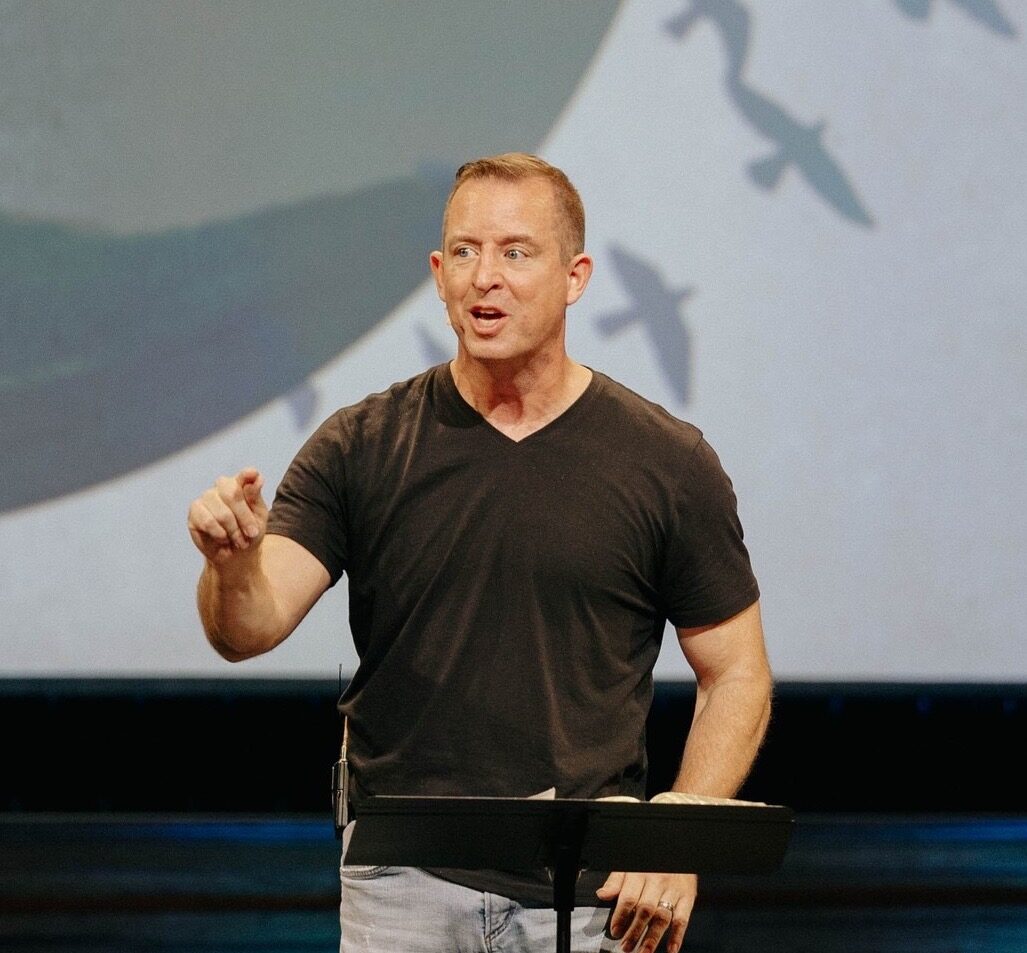Capturing the Congregation
Sharing the Gospel can be accomplished with more than just scripture. Like a persuasive essay, sometimes all it takes is a good hook.
Story By Raylee Foster
We all remember the stories we read as little kids, the ones with superheroes and happy endings. Those fairytales may have been left in our childhood, but what if stories with these profound messages weren’t a thing of the past? What if we’re still being told stories—but instead of reading them before bed, we find them in the pews on a Sunday morning?
It’s A Series: Highland Baptist Church’s John Durnham decides on a series and spends weeks preaching on the chosen topic. Photo courtesy of Highland Baptist Church

Highland Baptist Church’s lead pastor, John Durham, said the focal point of all sermons is scripture, but that there are ways to draw additional attention to the scripture with the use of a story. He said that on occasion while he tells modern stories he can see the congregation turn their heads up from “the Bible or the ESPN app,” but he hopes they leave with a recollection of God’s word and not his own story.
“God gives a promise to scripture that when God’s word goes out there’s always a benefit and it will always yield a crop,” Durham said. “Stories aren’t on the same level as scripture, but if they can help elevate scripture and make scripture more understandable then I think they have a really strong place in preaching.”
By incorporating more modern connections to scripture’s message, Durham said the audience is able to relate to it. This addition keeps the congregation engaged, and is a point of memory for church members after they get out of the pews and start their new week.
“People resonate with the dailiness of storytelling, the comprehension,” he said. “A parable or a story can be more relatable, and even appreciated, when it’s in normal, natural, present stories.”


Harris Creek Baptist Church pastor Nate Hilgenkamp also said that stories are a tool that keeps the audience engaged in what’s being said about God’s word. At Harris Creek, Nate said, the preaching outline involves beginning with a story to hook the congregation and make them curious about what scripture follows with.
“The moment where the story is really helpful is the moment right after you’ve told the story,” Hilgenkamp said. “It sets you up to want to listen to the rest of the message of ‘now I want to learn from God’s word.’ Hopefully it will help them understand the scripture better to where they can apply it to their life.”
Entertaining the congregation may seem like the goal of incorporating a story in a sermon, however Hilgenkamp warns people against telling a fun story just to get a response. If the story has no relevance or connection to the scripture, it shouldn’t be used.
“The story is always birthed out of the subject, because we want it to be Bible first, Bible based, and not necessarily story based,” Hilgenkamp said. “If it doesn’t connect to the text, it’s just a distraction and it turns into entertainment.”
The engagement of a sermon should still revolve around the scripture’s message, Hilgenkamp said. Although being engaged is a goal, being entertained is not.
“We want sermons to be engaging, but we don’t want it to be like, ‘I’m showing up here like I would to watch a movie or comedy show,’” Hilgenkamp said. “We always want any story we tell to help clarify the text, and if it doesn’t do that, it’s just a waste of time.”
Both Hilgenkamp and Durham said that storytelling is rooted in the way Jesus presented his messages, and although it may not receive the same response from everyone in the congregation, it is a way of modeling messages after Christ’s own words.
“Jesus told stories all the time and spoke in parables all the time,” Hilgenkamp said. “Matthew 13:34 said that he never spoke without using parables, so whenever people push back with comments like ‘just give me the Bible,’ we say we want to teach like Jesus did, and he told stories all the time.”
Alison Gerber, a doctoral candidate in Baylor’s Seminary School, said she found her way to preaching after being a “failed screenwriter and poet.” Her connection to literature and writing gave her a unique perspective on preaching. She found that more than anything, preachers are storytellers.
“Sometimes preachers talk about using stories as a tool to capture people’s imagination or move their heart, or pastors can seem more real and relatable through stories,” Gerber said, “but I think that one of the ways we can actually think about preachers is as storytellers.”
Gerber said that as preachers study scripture, they go through a process similar to a journey, and it ends with the message they decide to preach. In their sermons, the goal for preachers is to bring the church on this journey with them through a sermon on a Sunday morning. Though personal stories are used in sermons, she said the greatest of them all is God’s story, and that the use of other stories are meant to draw the church further into scripture.
“Preachers have got this responsibility to tell God’s story, the good news of the gospel,” Gerber said. “And as a story, of course we have this responsibility to tell that story with all the tools we have to tell it well.”
Just as Gerber noted that God’s story is the greatest of them all, Durham also said that Jesus Christ sets an example for preachers as the greatest story teller.
“Storytelling in sermons has its origins in Jesus telling stories for his sermons and his parables,” Durham said. “Any time a preacher tells a story in a sermon they can always harken back to Jesus being a great storyteller of parables as he preaches.”

